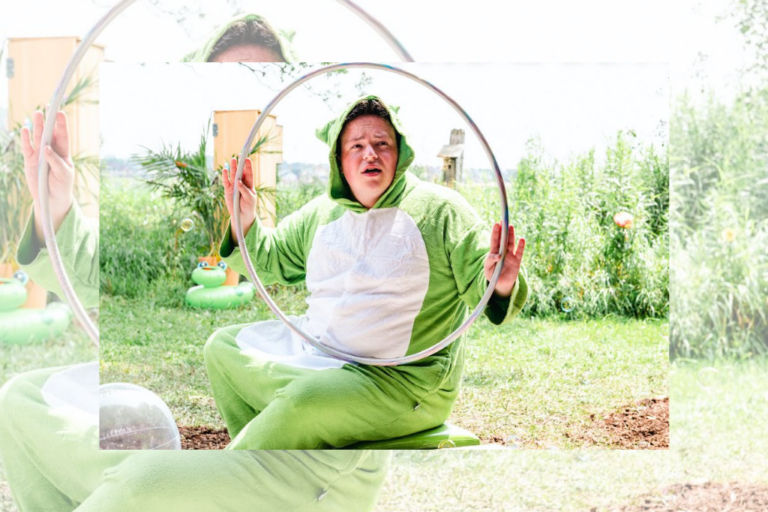REVIEW: Tarragon’s wonderful Benevolence reflects on diaspora, community, and place
In its first moments, Benevolence breaks the fourth wall. Welcomed into the performance space, a few audience members volunteer to participate in an opening dragon dance. They’re later offered tea, timed to be served at just the right temperature.
This is the vibrant, communal opening to Kevin Matthew Wong’s world premiere work, produced by Tarragon Theatre in association with Why Not Theatre and Broadleaf Creative. A one-act autobiographical solo performance that’s part play, part documentary, Benevolence traces a narrative of movement and migration while navigating questions about diasporic cultural identity and community across generational divides. Drawing on Wong’s experience with his own Hakka culture (China’s nomadic people, whose name translates to “guest families”), these themes are deeply personal. They also, as Wong explains in a program note, engage with broader questions “about identity and being here in Canada,” which will likely resonate with audiences from a diverse range of backgrounds.
The play (written and performed by Wong, with consulting direction by Mike Payette) follows Kevin, a young, Toronto-based theatre creator unexpectedly invited to develop a piece based on Hakka identity for the upcoming World Hakka Conference. Worried that he lacks an understanding of his culture (and the authority to share it), Kevin connects with his family and with Hakka communities as far away as Vancouver and Victoria as he works to understand his culture and his place within it.
(For audience members like myself who may be unfamiliar with Hakka culture prior to seeing the play, Kevin’s journey also serves as a generous and accessible introduction, as we are invited to learn alongside him.)
Tarragon’s production is one of a series of works Wong has developed exploring Hakka culture and identity. Others include a documentary (also called Benevolence), and 2024’s immersive Benevolence Hall installation, which won the inaugural Dora Award for outstanding innovative experience. Wong’s versatility in working across mediums is clear in Tarragon’s production as he crafts a collage of multimedia elements which come together in an attention-grabbing (and attention-holding) 90 minutes.
His script is heartfelt, conversational, and at times poetic, moving effortlessly between heavier moments of grief and lighter moments of joy and humour. Across the board his dialogue flows smoothly and his characters feel real. Wong’s delivery, too, is spot-on: honest and evocative, and complemented by fluid gestures and a dynamic use of the playing space. In some moments his performance is more abstract, working with mime and dance, while in others Wong’s character work shines as he embodies many of the individuals Kevin meets (especially distinct are the insistent and encouraging conference planner Sonia, with her penchant for standup comedy; and the defensive George, who questions whether Kevin is “Hakka enough”). In other scenes the fourth wall drops again, and Wong’s storytelling is straightforward as he returns to address the audience directly.
A visually striking support for the play’s at times documentary-like style, video projections (designed by Wong) appear on a range of surfaces across Echo Zhou 周芷會’s set, turning folding tables placed on end into doors, and the wall behind the playing space into community centre interiors and rainy cityscapes. Chris Ross-Ewart’s sound design seamlessly supports these visuals. From both literally and metaphorically disruptive ringtones to more atmospheric soundscapes, Ross-Ewart and Wong’s combined audio and visual work merge to evoke an array of physical places and emotional registers.
The projections also present a unique opportunity for Wong to share the stage with others: in some cases he interacts with the projections — like when he poses to recreate a photo with Peter, a leader at Vancouver’s Hakka community centre — while in others he lets them speak for themselves. In one particularly poignant sequence he steps aside completely to allow the audience to observe a conversation with his centenarian grandmother, a powerful representation of intergenerational connections and divides.
A meditation on a personal journey with one’s culture that also reflects more broadly on themes of diaspora, community, and place, Benevolence is technically masterful and emotionally resonant. I’ll be thrilled to see where Wong takes this project next.
Benevolence runs at Tarragon Theatre until May 4. Tickets are available here.
Intermission reviews are independent and unrelated to Intermission’s partnered content. Learn more about Intermission’s partnership model here.















Comments